by M. C. Jennings | Nov 17, 2015 | Academics, COBA Faculty, College Decisions, Current Students, Human Resource Management, Uncategorized
Senior management major, Hayley Griffin, was honored at the HR Southwest Conference (HRSWC) on October 26th, as she was one of four students who received The Excellence in Education Student Scholarship. Recipients of this scholarship are chosen based upon their academic standing, involvement in their community and campus, and by recommendations of their professors, advisors and/or employers.
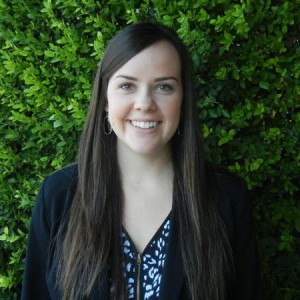
Hayley Griffin
Dr. Malcolm Coco, professor and SHRM Student Chapter Advisor, nominated Hayley for the scholarship. Dr. Coco said that Hayley has proven to be an outstanding employee, currently working in the ACU HR department and as a student assistant to the COBA marketing and recruiting manager. He touted Hayley’s intelligence, personable demeanor, abilities, accomplishments and work ethic. As the current president of the SHRM student chapter, he said that Hayley has shown initiative and leadership as she attends professional chapter meetings and has supported the chapter’s request for student chapter involvement in joint activities and research. Hayley is also treasurer of the women’s social club Sigma Theta Chi, a member of Phi Eta Sigma Honor Society and is on the Dean’s Honor Roll.
Dr. Coco went on to say that, “Whether she is performing volunteer work for Meals on Wheels, Habitat for Humanity or volunteer tutoring for an elementary school, she is always totally engaged. The bottom line is that Hayley continues to excel in every aspect of her life and has demonstrated superb initiative and leadership. She is the epitome of an all-around outstanding person. Whether it is academics, service to the community, involvement in campus activities, she is always leading the way. She is a top drawer person.”
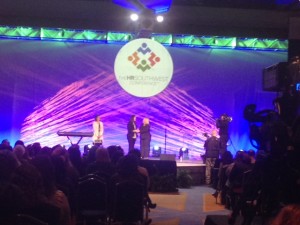
Hayley receiving The Excellence in Education Scholarship
The HRSWC is a regional human resources conference held in Fort Worth every October. The conference is a 3 day event filled with educational sessions, keynote speakers, and networking opportunities. The educational sessions focus on 8 different areas in HR ranging from benefits to HR development to recruiting the best talent. This year the keynote speakers were David Pogue, the founder of Yahoo Tech, and Soledad O’Brien, the founder of Starfish Media Group.
As a student attending HRSWC, Hayley said, “There are so many outstanding networking opportunities to grow your professional network. There is a market place in the convention center that over 200 companies set up booths to tell people about their company and solutions, so it’s almost like networking heaven! There are some educational sessions geared towards students and how to go about the internship/job search, how to network, and how to get the most out of the conference. This year my favorite session was titled ‘Essential Global Recognition and Engagement Insights’. The speaker presented research that was conducted on different companies across the global market and the differences in how incentive pay and culture are linked. For example, in Brazil, employees expect to be recognized differently than here in the US, in India, or in the UK. It was interesting to hear about cultural differences like this and I am looking forward to being able to use what I learned not only from this session, but the entire conference, into my future career.”
The Society for Human Resource Management student chapter is sponsored by the local professional human resources chapter. There are 27 professional and student chapters in the state of Texas. The Big Country SHRM is ACU’s sponsoring chapter and provides all types of support for the student chapter. Student officers are part of the professional chapter’s executive committee and regularly attend monthly meetings. The student chapter members are also invited to attend each month’s chapter meeting to hear the presentation for that month. The Big Country SHRM also supports the students by offering scholarships for attending the state SHRM annual conference and the student leadership conference. The student chapter provides support for the professional chapter by conducting surveys to gather information from its members and provides support for professional chapter activities.
The student chapter is one of 27 in the state of Texas and over 400 nationally. Over 10,000 students belong to SHRM student chapters. Each student must be chartered and sponsored by a professional chapter. ACU’s chapter is sponsored by the Big Country SHRM professional chapter. The Society of Human Resource Management is the world’s largest association devoted to human resource management. The society serves the needs of HR professionals and advances the interests of the HR profession. Founded in 1948, SHRM has more than 225,000 members in over 125 countries, and more than 575 affiliated chapters. Visit shrm.org
by M. C. Jennings | Nov 12, 2015 | Academics, COBA Faculty, Current Students, Research
Here are the JP College Football Rankings after the 10th week of the season. (See our first post for a brief explanation of our methodology.)
Our top two teams, Notre Dame and Clemson, remain unchanged and Alabama’s big win over LSU moved them from 6th to 3rd place. Notice that ours and the College Football Playoff (CFP) rankings agree on 3 out of the 4 top. Yet here is one way we can see a dramatic difference between our ranking system and the more traditional polls and rankings.
In our rankings last week, Michigan State and Michigan were 9 and 10, respectively. This week, Michigan State, who lost, moved up 2 positions and Michigan, who won, moved down 4 places. This is because the former narrowly lost on the road to a decent Nebraska team (#19) whereas the latter won at home against a very weak Rutgers side (#104). Similar movements occurred all throughout our rankings. Another major difference between ours and more traditional ranking systems is that ours is forward-looking, meaning it is meant to predict future outcomes whereas more traditional systems are primarily designed to reward past performance. This is why a 3 loss USC is ranked 4th in our system (#3 last week) yet they are outside the top 25 of the AP poll. Baylor remains unchanged from last week at #60. A good performance against a very strong OU team (#5) this Saturday will probably see them rise, even with a loss. The top 50 teams are listed at the end of this blog post.
Relationship with courses we teach
One might reasonably ask what this has to do with the courses we teach. It turns out, quite a lot! For example, one of the courses I teach, data mining, initially involves separating data into two datasets or partitions. We then run our algorithm on the first partition to teach it. Next, we examine how well it forecasts the results in the second partition. This is exactly how we came up with these rankings. The benefit of this partitioning process is that when we say that we can beat the Vegas line 56% of the time, it means we are beating it on new data, not merely data that our algorithm used to learn. It is actually very easy to “predict” results that you are using to learn; what is hard is predicting or rather forecasting results that are new. In a later post we’ll discuss some of these ideas and their relationship with what we teach in greater detail. We will also examine other research applications of this ranking system.
| 1 |
Notre Dame |
| 2 |
Clemson |
| 3 |
Alabama |
| 4 |
USC |
| 5 |
Oklahoma |
| 6 |
Tennessee |
| 7 |
Michigan State |
| 8 |
Stanford |
| 9 |
Utah |
| 10 |
Florida |
| 11 |
LSU |
| 12 |
Ohio State |
| 13 |
Florida State |
| 14 |
Michigan |
| 15 |
Oklahoma State |
| 16 |
Mississippi State |
| 17 |
Wisconsin |
| 18 |
Ole Miss |
| 19 |
Nebraska |
| 20 |
Penn State |
| 21 |
Washington |
| 22 |
Texas |
| 23 |
TCU |
| 24 |
Louisville |
| 25 |
California |
| 26 |
Georgia Tech |
| 27 |
Navy |
| 28 |
Temple |
| 29 |
Arkansas |
| 30 |
BYU |
| 31 |
Texas A&M |
| 32 |
Pittsburgh |
| 33 |
Cincinnati |
| 34 |
Texas Tech |
| 35 |
Iowa |
| 36 |
UCLA |
| 37 |
South Carolina |
| 38 |
Bowling Green |
| 39 |
Memphis |
| 40 |
East Carolina |
| 41 |
Central Michigan |
| 42 |
North Carolina |
| 43 |
Auburn |
| 44 |
Oregon |
| 45 |
West Virginia |
| 46 |
Virginia |
| 47 |
NIU |
| 48 |
Western Kentucky |
| 49 |
Houston |
| 50 |
Northwestern |
by M. C. Jennings | Nov 6, 2015 | Academics, COBA Faculty, Research, Uncategorized
Dr. Ryan Jessup and Dr. Don Pope have teamed up to create the Jessup Pope NCAA Division I FBS rankings. Jessup, Assistant Professor of Marketing, teaches marketing research and data mining and Pope, Associate Professor of Management, teaches statistics and intro to management. These two great statistical minds decided to put their knowledge and experience to practical use in devising a new method of ranking college football teams. The blog today is written by Dr. Jessup as our COBA Blog guest writer.
I present to you the inaugural Jessup Pope NCAA Division I FBS rankings. This is a ranking of all 128 college football teams in the bowl subdivision based on the performances this season to date.
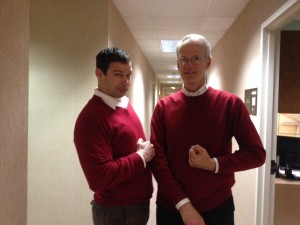
Dr. Ryan Jessup and Dr. Don Pope
A brief history
A few years ago, after the wildly improbable success of our faculty/staff intramural soccer team, the Sunflowers of Death (which is a topic for another time, but suffice it to say that we have finished 2nd place in 4 out of the 7 seasons we have played), we wanted to come up with a better way to rank sports teams.
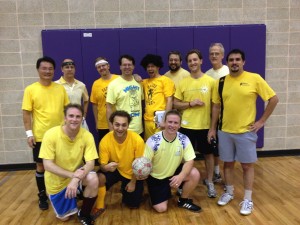
The Sunflowers of Death
With the help of our then-student worker, Amy Morris, we collected the data from multiple seasons of a variety of sports. Don Pope and I then took the Google PageRank algorithm, the algorithm that jump-started the search engine giant – and still underlies their current approach today – and made several modifications to it to allow it to rank teams, instead of webpages. We also enabled it to account for home field advantage and temporal decay of performances (this is where games early in the season weigh less in the rankings than more recent games), among other things. We then forecasted bowl games at the end of three seasons, finding that our algorithm correctly predicted the winner (1) more than 60% of the time, (2) better than the BCS (or its replacement, the College Football Playoff), and (3) even out-predicted the Las Vegas betting line 56% of the time. We presented this work at the Christian Scholars Conference in Abilene this past summer. More recently, with the help of several faculty in the SITC, most prominently Dr. Ray Pettit, I wrote a screen-scraper in python (a programming language) to scrape off all the information for each college football game so that we can begin looking at our rankings on a weekly basis.
The rankings
The effectiveness of the ranking system lies in the fact that it not only takes into account your team’s performance against other teams but also the other teams’ performance against other teams. So let’s take a quick look at these initial rankings. Some of these rankings accord with our expectations and others outrageously violate them. On one hand, quite reasonably, Notre Dame and Clemson are 1 and 2, and Alabama, Stanford, Michigan State, and Florida are all in the top 10. On the other hand, USC is No. 3, Texas is No. 16, whereas Ohio State and Baylor are No.’s 11 and 60, respectively, all apparently crazy! Given that they were just punished by Iowa State, I don’t believe that Texas is the 16th best team in the nation, but that aberrant win over Oklahoma at a neutral site is currently making Texas look very good. And what’s the deal with Baylor and Ohio State? Well, part of the issue is that Baylor and Ohio State are both in power conferences and began the season ranked in the top 5. Yet our system cares neither about which conference your team is in nor is it biased by preseason rankings: it only takes into account your team’s performances and the quality of the opponent (as judged by their performances against their opponents). So, apparently they have not played very strong opponents thus far.
I think as the weeks continue our rankings will begin to accord a bit more with our expectations but I won’t be terribly surprised if at the end of the season there are still some outrageous-looking rankings. You don’t beat the Vegas line 56% of the time by just heeding the status quo!
Here are our rankings at this time:
| Rank |
After Week 9 |
| 1 |
Notre Dame |
| 2 |
Clemson |
| 3 |
USC |
| 4 |
Florida |
| 5 |
Tennessee |
| 6 |
Alabama |
| 7 |
Oklahoma |
| 8 |
Stanford |
| 9 |
Michigan State |
| 10 |
Michigan |
| 11 |
Ohio State |
| 12 |
Utah |
| 13 |
Ole Miss |
| 14 |
LSU |
| 15 |
Georgia Tech |
| 16 |
Texas |
| 17 |
Washington |
| 18 |
TCU |
| 19 |
Mississippi State |
| 20 |
Wisconsin |
| 21 |
Florida State |
| 22 |
Virginia Tech |
| 23 |
Penn State |
| 24 |
Nebraska |
| 25 |
California |
| 26 |
Louisville |
| 27 |
Memphis |
| 28 |
Texas A&M |
| 29 |
Texas Tech |
| 30 |
Central Michigan |
| 31 |
Bowling Green |
| 32 |
East Carolina |
| 33 |
BYU |
| 34 |
Temple |
| 35 |
Oklahoma State |
| 36 |
Iowa |
| 37 |
Arkansas |
| 38 |
Pittsburgh |
| 39 |
Boise State |
| 40 |
UCLA |
| 41 |
Iowa State |
| 42 |
West Virginia |
| 43 |
Miami (FL) |
| 44 |
Northwestern |
| 45 |
Cincinnati |
| 46 |
Utah State |
| 47 |
Western Kentucky |
| 48 |
Oregon |
| 49 |
Tulsa |
| 50 |
Washington State |
| 51 |
Minnesota |
| 52 |
Boston College |
| 53 |
Louisiana Tech |
| 54 |
San Diego State |
| 55 |
South Carolina |
| 56 |
Auburn |
| 57 |
Virginia |
| 58 |
Houston |
| 59 |
South Florida |
| 60 |
Baylor |
| 61 |
Navy |
| 62 |
North Carolina |
| 63 |
NIU |
| 64 |
Kansas State |
| 65 |
Duke |
| 66 |
Georgia |
| 67 |
Purdue |
| 68 |
Connecticut |
| 69 |
Maryland |
| 70 |
Appalachian State |
| 71 |
Western Michigan |
| 72 |
Toledo |
| 73 |
Arizona State |
| 74 |
Vanderbilt |
| 75 |
NC State |
| 76 |
Syracuse |
| 77 |
Indiana |
| 78 |
Wake Forest |
| 79 |
Missouri |
| 80 |
Southern Miss |
| 81 |
Marshall |
| 82 |
Ball State |
| 83 |
Kentucky |
| 84 |
Georgia Southern |
| 85 |
Illinois |
| 86 |
Massachusetts |
| 87 |
SMU |
| 88 |
Air Force |
| 89 |
Arizona |
| 90 |
Buffalo |
| 91 |
Troy |
| 92 |
Oregon State |
| 93 |
Colorado |
| 94 |
Wyoming |
| 95 |
Colorado State |
| 96 |
Akron |
| 97 |
FIU |
| 98 |
Arkansas State |
| 99 |
Rutgers |
| 100 |
Ohio |
| 101 |
UTSA |
| 102 |
UNLV |
| 103 |
Middle Tennessee |
| 104 |
Hawaii |
| 105 |
Florida Atlantic |
| 106 |
UCF |
| 107 |
Eastern Michigan |
| 108 |
Miami (OH) |
| 109 |
Nevada |
| 110 |
San Jose State |
| 111 |
Tulane |
| 112 |
Rice |
| 113 |
Kent State |
| 114 |
Idaho |
| 115 |
Louisiana Monroe |
| 116 |
South Alabama |
| 117 |
Texas State |
| 118 |
Army |
| 119 |
Fresno State |
| 120 |
Kansas |
| 121 |
Louisiana Lafayette |
| 122 |
New Mexico |
| 123 |
New Mexico State |
| 124 |
North Texas |
| 125 |
Georgia State |
| 126 |
UTEP |
| 127 |
Old Dominion |
| 128 |
Charlotte |
by M. C. Jennings | Oct 20, 2015 | Academics, Careers In..., COBA Faculty, College Decisions, Current Students, Faith Infusion, Uncategorized
What is your educational background?
I received my:
- Bachelor’s degree from ACU in 1976 (first graduating class of ACU, formerly ACC).
- MBA from Mary-Hardin Baylor in 1992
- Ph.D. from Texas A&M University in 2001
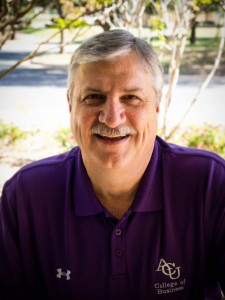
Dr. Phil Vardiman
What is your work background?
My work background includes Management and Leadership experiences in “Manufacturing Operations” and “Human Resources”. Companies I worked for include; General Tire & Rubber Co., Avery Dennison, and Cardinal Health. I taught one year in Lubbock ISD – way back in the 70’s. Prior to coming to ACU, I also taught at Texas State University in their graduate HR program.
What do you teach at ACU?
I teach management class (primarily MGMT 330) and I also teach HR classes (MGMT 447 & MGMT 337). Occasionally I teach in the graduate OD program.
What committees/other duties do you have at ACU aside from teaching?
This year I am the Faculty Senate Chair which means I get the opportunity to participate on many committees. Some of these include; the Provost’s Cabinet, Faculty Senate, Benefits Committee, Pricing Team, and Debt Reduction Team.
Being the Faculty Senate Chair is a great opportunity to provide service for the university and also work closely with many people across campus.
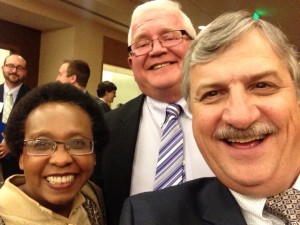
Phil with colleagues Orneita Burton and Ian Shepherd
What drew you to teaching? Why did you want to work with students?
I was blessed to have excellent teachers in my past that inspired me to love learning and helping others succeed. I have always wanted to teach and being in the business field provided me an excellent opportunity to expand my learning and also the foundation for advancing my education to reach my goal of teaching.
What’s the best part of working with students?
My biggest enjoyment in my job is mentoring and getting to know my students. I love to see them succeed and do great things. I strongly believe that every student can (and should) succeed. I’m amazed at the many things our students accomplish.
Have you ever given up any big opportunities to keep working with students?
I did change careers and with that there was a financial impact, but I believe that the most important part of a person’s career is not how much money they make – it is much more about the positive difference they can make in the relationships and lives of those around them. I also feel that I have gained much more as a college professor than I ever gave up.
Outside of teaching, what passions and hobbies do you have?
I have been blessed to experience the “Grandparenting” stage of life and it is wonderful. I have 5 grandchildren and they are so much fun.
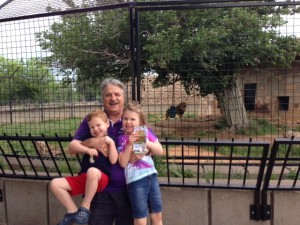
Phil with two of his five grandchildren
I also have to mention Golf – I do enjoy the outdoors and a good round of golf. I also started taking piano lessons at the good age of 55. It has been fun and very challenging. (Playing the Piano: http://www.reporternews.com/news/abilene-music-teachers-hold-recital)
What is a good, early story about your teaching?
Besides the many moments when your students encourage and touch your life in a significant way I would say there have been several funny/interesting moments.
One that I remember well was the time I gave a test and offered the students the opportunity to take the exam in a very different way. I told them they had the option to take the exam and purposefully try and miss every answer and I would give them a “100” on the exam – of course they had to miss every answer – if they even got one right – then they would only get the score of those they got right. You must know there were several True/False and Multiple Choice questions on the exam. There was also some short answer. The outcome of this crazy moment turned out to be a funny memory (at least now it is funny). I was also able to get two published articles from this event.
Tell me about a project or accomplishment that you consider to be the most significant in your career.
It has to be my Ph.D. later in life and the challenge of completing this goal while still working and raising a family. My wife deserves most of the credit!
Do you do any charity or non-profit work?
In 2014 I became an Elder at the Hillcrest church of Christ. I have learned the importance of “service” and “encouragement” at a whole different level. I also currently serve on the Big Country Society for Human Resources executive board (BCSHRM).
Who is your role model, and why?
This is a difficult question and there are several who come to mind.
- Billie Gill (a Christian lady who encouraged me to stay true to the Word of God and be a strong family man – in many ways she was a mother to me)
- Claude Burns (an Elder and Christian man who gave me such good advice and the opportunity to grow as a young family man)
- Bill O’banion (my father-in-law, who gave me a very positive and strong Christian example. Bill is also a father example to me in so many ways)
- Jerry Drennan (a college professor who inspired me to teach by his example)
- And the most important role model is my wife, Jackie. She is such a good Christian example in so many ways and it has been wonderful to see her influence in our children and the encouragement she continually gives me.
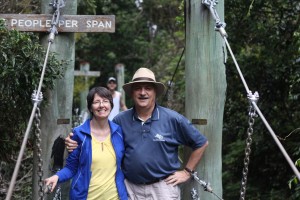
Phil and Jackie Vardiman
Who was your most inspirational professor and why?
As noted above, Jerry Drennan. He was always encouraging and also pushed me to do my best. I enjoyed his classes and teaching style. I remember wanting to teach just like he did.
If you could have a superpower, what would it be and why?
This is always an interesting question and my first thought would be to “fly”. Hard to beat this one. If I had a second choice, it would be to speak and read every language (this would be amazing and provide an outstanding learning opportunity).
What is something that students might be surprised to find out about you?
I found my twin sister when I was 50 years old.
What would you really want students and alums to know about you?
I love what I do! It is such a wonderful career and the blessings never cease. My first career enjoyment is mentoring students and my second is teaching.
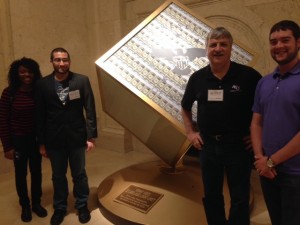
Phil with some of his students
by M. C. Jennings | Oct 15, 2015 | Academics, Accounting, COBA Faculty, Current Students, Uncategorized
What is your educational background?
PhD – Texas A&M; MBA – University of Memphis; BBA – Harding University
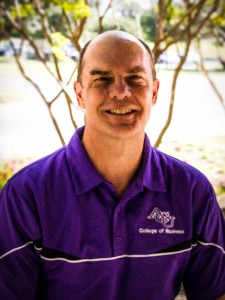
David Perkins
What is your work background?
While getting my MBA I had a chance to teach and loved it…I knew one day I wanted to make that my career. I worked in public accounting for three years with Arthur Young & Co. in Dallas, TX, and then returned to Harding to teach full time. One additional note: I sold books for five summers to pay my way through college.
What do you teach at ACU?
Undergraduate: Financial Accounting – the introductory accounting course for all business majors
Graduate: Governmental and Not-for-Profit Accounting; Financial Statement Analysis
Outside of teaching, what passions and hobbies do you have?
I enjoy writing songs and playing the guitar. I also enjoy travel and hiking. When traveling, I love to drive with the windows down (but with the A/C cranked up!). My wife, Karla, is pretty cool about that…she enjoys it, too…like I said, she’s pretty cool!
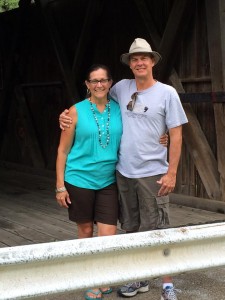
David and Karla Perkins
Tell me about a project or accomplishment that you consider to be the most significant in your career.
I think the most significant thing I’ve done in my career is to have a part in preparing students to begin their own. My intent is for them to feel competent and confident, knowing that they have as much to offer as anyone else. I hope I’ve encouraged them to be persons of character and to lean on Christ as their hope and confidence.
What is something that students might be surprised to find out about you?
Hmmm……
What would you really want students and alums to know about you?
I love what I do. I feel very blessed to have had the opportunity to teach.
by M. C. Jennings | Oct 13, 2015 | Academics, Accounting, COBA Faculty, Current Students, Uncategorized
At the annual COBA faculty/staff retreat, Dr. Rick Lytle announced the creation of two professorships established by Mark and April Anthony to honor two COBA faculty of significant influence, Jozell Brister and Bill Fowler. Dr. Lytle stated that, “Each of these professors have had a profound impact in the lives of students over the course of their distinguished careers at ACU. Bill and Jo are legends in COBA history and these named professorships will help establish their names in the minds of faculty and students for years to come. “
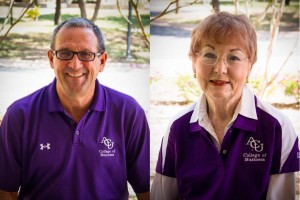
Bill Fowler and Jozell Brister
Jozell Brister was hired as a part-time instructor in the fall of 1979 and joined the business faculty full-time on January 15, 1980 having been a highly regarded business teacher at Abilene High School before that. She has served as the Assistant and Associate Dean for deans Petty and Lytle and is now an Associate Professor of Management Sciences. Of notable achievement, she worked with Dean Bill Petty, traveling from the west coast to the east coast researching business buildings and assisting in the university-wide effort to raise money for the Mabee Business Building and helped, as she puts it, “with odds and ends while the building was in the construction phase.” Jozell directed accreditation efforts for ACBSP and AACSB, was awarded the COBA Master Teacher award, and has a teaching enrichment fellowship established by Dr. Bill Petty in her name. In addition, she was the first director/advisor of COBA’s inaugural COBA Connections advising office.
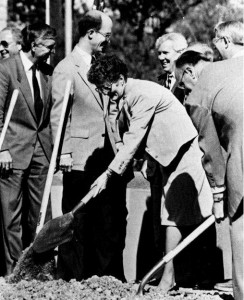
Jozell Brister participates in the groundbreaking ceremony for the Mabee Business Building
When asking her about her advising role, she says that, “In the fall of 1980, I was assigned to be the academic advisor for all the business students and we had around 1,200 students. At registration time I had to approve their schedules. One semester I had a bad cold during the registration period. I had such a long line of students waiting for me to approve their schedules, that I didn’t even have time to blow my nose between students. Needless to say, I was not very good at that job. I don’t remember how many semesters I served as academic advisor to the business students. Dr. Faubus had been doing the advising in addition to teaching 4 or 5 classes each semester. After maybe two or three semesters, Bill Petty re-assigned the advising, and I began serving in the Dean’s Suite.”
Dr. Monty Lynn stated that “Jozell has been a constant friend and capable economics teacher for thousands of students passing through ACU, shepherding students through what is a challenging subject for many. She often meets with students in her office as a guide and friend and would win the college’s ‘Best Organized’ award if we ever minted one. She served as an administrator during the college’s formative years and many of her accomplishments – including the advising center and coordinating accreditation efforts – continue as COBA distinctives today. Several years ago, economist Alan Blinder published a book title, Hard Heads, Soft Hearts. That title describes Jozell well as she can do econometric calculations and graphing with the best, and she has dep convictions about economic fairness and justice. While I was still in graduate school, Jozell agreed to join me on a research project on labor union recruiting. Since that publication, she has co-authored research with several COBA faculty members on downsizing, teaching and learning, lifetime giving, non-profit management, and other topics. Jozell is an exceptional colleague, loved teacher, frontier Texan, and occasional humorist – and she has blessed this college through a lifetime of leadership.”
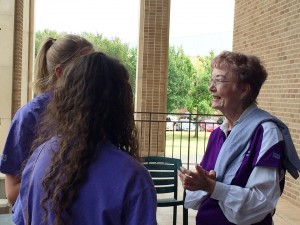
Jozell Brister visiting with incoming freshmen during Wildcat Week
When asked what having a professorship named after her means, she said, “It means a great deal to me. I am deeply touched and honored to have this professorship named for me.” Brister said that, “I would like to be remembered as a teacher who loved her students and who also delighted in being on the faculty at ACU. I would also like to be remembered as someone who had a sense of humor and who loved to make people laugh.”
Bill Fowler came to ACU with an accomplished resume having been a Senior Accountant at Deloitte from 1975-1977 and then Vice President for Finance at Rochester College from 1978-1983. He began working at ACU in January, 1984 as the Assistant Vice President for Finance. In that job, he was responsible for University Financial Reporting, Budgeting, Administrative Computing, Campus Stores and Auxiliary Services, and Physical Plant. In the fall of 1984, he began teaching one section of Accounting Principles and in the fall of 1987, began teaching one section of Auditing. Fowler began his full-time role as a COBA faculty member in the fall of 1991 and was the chair of the Department of Accounting and Finance from 1992-2014.
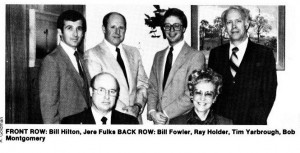
Bill Fowler in the early days of his ACU career
In his previous administrative role with ACU, Bill was on the building project team for the Mabee Business Building and recounts the many great stories about the construction of the building and the people involved with that project. He stated, “During my tenure as department chair, we added the degree in Financial Management and created the Master of Accountancy degree. The number of students increased from about 135 in 1991 to approximately 250 today. I am proud to have led in the hiring process of 7 of our current Accounting and Finance faculty members. I am especially proud of the role I was able to play in enhancing our relationship with many accounting firms to increase employment and internship opportunities for our students. Since 1991, we have more than tripled the number of firms that come to campus to recruit our students.”
Fowler says that having a professorship named after him is, “Humbling and rewarding. We have so many great professors at ACU. I am honored to represent them and I am grateful for the generosity of the Anthony’s in making this gift.” When asked what he would like his legacy in COBA to be, Bill stated, “I am not sure I am comfortable with the idea of legacy, but I can tell you what is important to me as a professor.
- I always try to be the best professor I can be. I stay current in my discipline, I connect with our profession, and I work on improving my teaching skills. I learned a long time ago that there was a difference in being a good teacher as compared to just being somebody who talked about what they knew.
- I always expect the best from my students.
- I enjoy being in the classroom and try to have some fun along the way.
- The relationships I have made with students are the best part of my work. They have enriched my life.
- It is important that we learn that no matter what we do, whether we are accountants or not, that our mission in life is to use our talents in ways that serve others and give glory to God.”
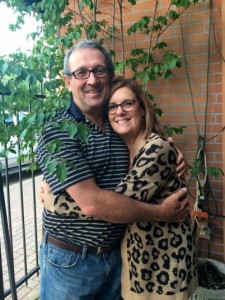
Bill and Carol Fowler
I think Dr. David Perkins summed up Bill Fowler well when he said, “Bill is the kind of leader who watches out for the best interest of those he represents, both students and faculty.”
These funds will be used by the respective departments, in honor of Bill and Jozell, to reward, nourish, and enhance faculty excellence in COBA through salary stipends and faculty research and development dollars. The dean and a select group of faculty will establish objectives, processes, and timelines for the selection and awarding of these professorships in this academic year. Dr. Rick Lytle says, “We are delighted to have these professorships in our college. Indeed, it is a privilege to be able to use these dollars to reward notable faculty for their accomplishments among us and to enhance their teaching, scholarship, and learning into the future. Jozell Brister and Bill Fowler are the ACU difference! They are individuals who share a great passion for students and their intellectual and spiritual development. They both are great talents in the classroom – among the best in COBA. For decades they have been faithful keepers of the ACU mission in business and share a common faith in God which helps them clearly and logically define right from wrong. As I begin my 25th year in COBA, I thankfully reflect on the blessing they have both been to me in this place we call the College of Business Administration. It has been my privilege to serve alongside two awesome colleagues: Jozell Brister and Bill Fowler.”















